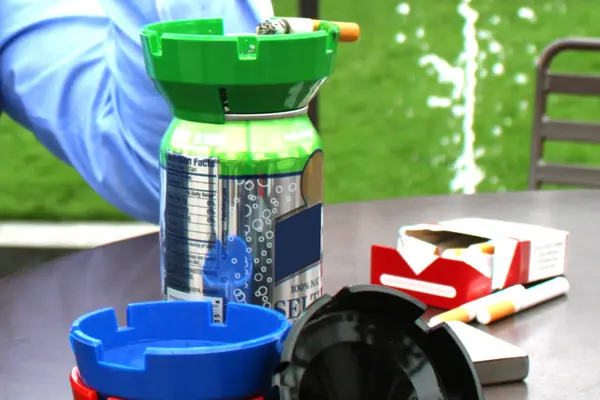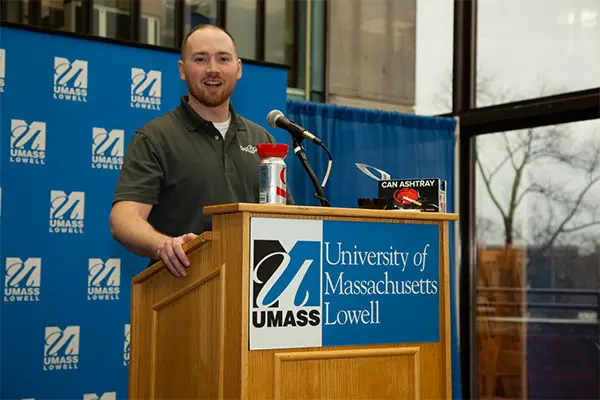2,600 Walmarts Carrying DifferenceMaker's Product

04/24/2018
By David Perry
For Justin Lozier ’17, ’twas curiosity that capped the can.
“There’s just something about me,” he says. “I always ask a million questions. I mean, I need to know everything.”
Industrious and driven to entrepreneurship, the 25-year-old mechanical engineering grad invented TopaCan, “the most convenient ashtray in the world.”
TopaCan turns almost any standard soda or beer can into a receptacle for cigarette butts. Made of hard plastic, it slides into place on top of the can. Smokers can fill the can with butts, and those who chew tobacco (like Lozier) or sunflower seeds can use it as a spittoon. A twist of the ashtray cuts off air to the can.
Lozier came up with the idea back in his student days at UMass Lowell. He was at a party and saw cans lined up on a counter, and he wondered how many of them would be used as ashtrays before being sipped by an unsuspecting partygoer. He decided to pursue his idea.
TopaCan won the $1,000 first-place prize at the Engineering Prototyping Competition in 2015 and the First to Market Award and its $4,500 purse at the 2016 DifferenceMaker Idea Challenge. Lozier was just getting started.
He introduced his creation last August at a four-day trade show of new products in Las Vegas. Distributors and product brokers were impressed.
“One guy stopped at the booth and I didn’t really have time to talk to him, but he plunked down $4.99 for a TopaCan,” says Lozier. A few days later, Lozier’s phone rang. It was the guy from the trade show, and one of his accounts was Walmart. It was TopaCan’s big break. The first order was for 81,000 units.
With TopaCan’s recent entry into 2,600 Walmart stores across the country, business has been humming. Things have begun to move so fast that in February, Lozier left his engineering job with an aerospace company to run TopaCan full time from the second floor of an old warehouse in Nashua, N.H. He has eight employees – seven part-timers and a full-time salesman.
It’s the first time Lozier hasn’t worked for someone else, and so far, the entrepreneur mantle fits.
“My dad told me never to leave a job before I have another one,” he says. “I love it.”

Although the number of smokers has declined in recent years, nearly 40 million remain, according to the American Lung Association. And, with the state-by-state legalization and decriminalization of marijuana, potential users of TopaCan are growing, notes Lozier.
Aside from the product’s simplicity and convenience, it also offers something some people seek out: the “Made in USA” stamp. While the trays are molded in Hudson, N.H., the rest of the packaging and shipping happens just downstairs from Lozier’s office.
In his office, which he built (“Yeah, a five-minute YouTube video, a trip to Home Depot and $300 later, office walls”), Lozier recalled his roots in engineering.
Not long after he was born, his father was involved in an accident that left him in a wheelchair.
“He is quadriplegic, paralyzed from the neck down,” says Lozier. “But he loved building things – stereo equipment, computers.“
His parents divorced.
“I lived with my mom and saw my dad every week. My dad has no movement of his hands, but he still loved building things. So, I became his hands.”
His father would order the components, and Lozier would build them. At 11, he put together his own computer.
“I’ve always been an entrepreneur at heart,” he says. “My mom got tired of my constant pitches and ideas, so she told me to write it all down. It started in middle school, so there was a book of ideas.”
Lozier has made it a priority to improve on his weaknesses. While he was in college, he took a job selling computers at Best Buy just to strengthen his interpersonal skills; he became a top salesman.
“TopaCan seems like a simple product, but Justin’s ability to prototype, manufacture and develop the supply chain to the point where he is in Walmart stores across the nation is very impressive.” -Steven TelloHe also immersed himself in the world of engineers. He worked internships at Parker Hannafin in Hudson, N.H. twice, first for a year as a mechanical engineering intern, then again as an engineer intern. He was also a mechanical engineering intern at iRobot in Bedford. He arrived at UMass Lowell as a transfer student after two years at Daniel Webster College in Nashua.
“UMass Lowell was the closest school to offer mechanical engineering,” Lozier says. “Plus, they had a machine shop and a 3-D printing machine.”
Early on, he heard about DifferenceMaker, and its emphasis on bringing ideas to life appealed to him. He fared well, but in the honors mechanical engineering program, his senior year “got a little bit crazy, so while I was always working on TopaCan, I put the competitions aside for a bit.”
The product may be low-tech, but getting it to market took ingenuity and persistence, says Steven Tello, the university’s vice provost for innovation and workforce development, who oversees the DifferenceMaker program.
Lozier “found a problem and came up with a solution that is clearly quite popular with the shopping public,” says Tello. “TopaCan seems like a simple product, but Justin’s ability to prototype, manufacture and develop the supply chain to the point where he is in Walmart stores across the nation is very impressive.”
“I love the challenges they posed at UML and DifferenceMaker,” says Lozier. “I really do. I owe huge props to DifferenceMaker. Doing those pitches, I thought it would just be in front of the judges, but there were like 300 people in the room. It was a great test.”
It isn’t lost on Lozier that UML is a smoke-free campus. Part of the appeal of TopaCan is its use as storage for cigarette butts (the most littered item) until they can be disposed of en masse.
Lozier says he continues to refine ways for eco-friendly disposal of the cans and is working with a company that recycles the butts into plastic.
He’s headed back to Vegas in August with plans to unveil new products, which he won’t discuss. But the entrepreneur in him is clearly thinking big.
“All those things in the tobacco section, the gadgets near TopaCan? I want to have all of those be my products.”




